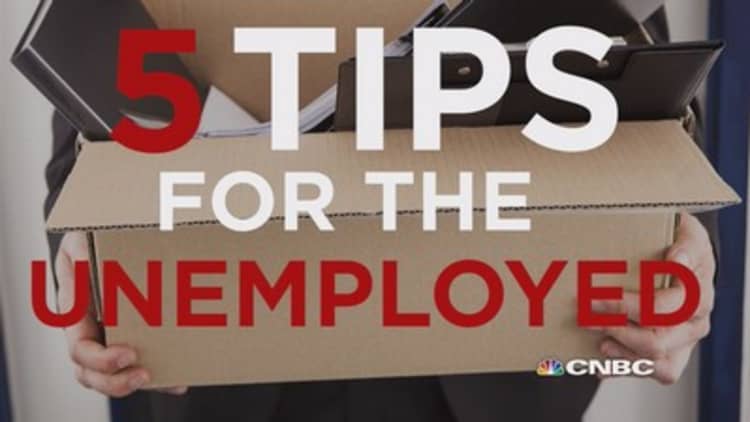
Earlier this year, a client of certified financial planner Rose Swanger received a sizable bonus from his employer. Two months later, he was laid off.
"He didn't see it coming," said Swanger, owner of Advice Finance. "He was blindsided by the decision from upper management."
Moreover, the client and his wife—who already had switched from full-time to part-time work to spend more time with their newborn baby—were financially unprepared to deal with the shock.
It's a common scenario, even though experts routinely advise people to have at least three to six months' worth of living expenses saved for such a situation. Swanger had recommended that her client set up an emergency fund several years ago, but following her advice was up to him.
Financial advisors say there are "must-dos" you have to tackle right away if you lose your job. One is to cut spending until you determine where new income will come from, whether it's a new job or tapping retirement funds earlier than you anticipated.
Read MoreTop tips for job switches
"If you are not working, this is the time to cut household expenses to a bare minimum," said Glenn Downing, a CFP and principal of CameronDowning. "Start cleaning your own house. Let the lawn guy go. That's where it starts."
Also, say advisors, look at trimming less luxurious expenses, such as cable, Internet and phone.
Apply for unemployment
"There is so much competition in these services that there can be surprising cost savings," added Cathy Curtis, CFP and owner of Curtis Financial Planning.
Additionally, see if you qualify for unemployment benefits, even if you never imagined yourself doing it.
"Unemployment benefits can help a person get through a tough period and keep a person from having to withdraw from their savings," Curtis said. "In my experience, most people will take the unemployment benefits, and even if they may feel shame about it, they do it."
An estimated 1.2 million people lose their jobs every month. And on top of figuring out how to cover basic living expenses, the newly unemployed must make decisions about other financial issues.
One of the most important considerations is insurance coverage, including medical and life.
"Since many employers provide health and life [insurance] for free or at a low cost, many employees don't buy additional assurance," Curtis said. "So if [they are] laid off, there's an insurance void."
Read MoreWhat freelancers should know
For medical coverage, federal law allows many people who have lost their jobs to keep their workplace insurance through COBRA. Generally, this will provide the ex-employee temporary coverage—up to 18 months—but it can be costly.
Other options include being added to a spouse's workplace plan (if the plan allows it) or finding coverage under the Affordable Care Act, otherwise known as Obamacare. Loss of a job qualifies as a special enrollment event, meaning you can sign up outside of the regular open enrollment period. This year, that ended Feb. 15.
Have kids? Get insurance
"Start looking on an exchange," Swanger at Advice Finance said, adding that because of the cost, she generally would not recommend COBRA coverage.
Life insurance can matter, too. Advisors say that if you own a home, are married or have children, replace your work-provided life insurance.
"If you are single and don't own a home or have kids, don't get it," Swanger said. "But if you are married or have kids, please, please, get life insurance."
The younger and healthier you are, the cheaper a term-life policy is. Advisors agree that workplace coverage is great. But if that is all you rely on, you will have a harder time replacing that coverage at a low rate if you lose your job and are older or have medical issues.
And if you get life insurance through a new employer, establish and maintain any policy you get before new employment, given the unfortunate fact that you might eventually lose that new job, too.
"Even after getting a new job, it may make sense to keep the extra insurance," Curtis said.
Another thing to think about is your retirement savings. If you can roll over your 401(k) plan or individual retirement account to a Roth IRA, now might be the time.
That's because the rollover could be taxed at a lower rate while your income is lower. A Roth rollover comes with immediate tax consequences. But its distributions are tax-free, while those from 401(k) plans or regular IRAs will be taxed as ordinary income.
You need to look at it as an opportunity. If you do that, you can approach [the job loss] in a very different way.Glenn Downingprincipal of CameronDowning
Advisors also say they help clients deal with the emotional fallout from losing a job.
"First, I listen. The client needs time to get it all out," said Downing of CameronDowning.
Before getting into the financial stuff, he focuses on the client's attitude.
"You have to look at this as one door closing and another opening," Downing said. "You can reinvent yourself or retool your skills. You need to look at it as an opportunity. If you do that, you can approach [the job loss] in a very different way."
Read MoreWhere to whistle while you work
The other important thing is to heed the advice of pros.
When Swanger advised her client and his wife in 2012 to not only create emergency funds but also start a Roth IRA as a backup due to its special withdrawal rules, they viewed those things as an expense instead of an investment in their future.
Now? "I hope they learned their lesson," Swanger said.
—By Sarah O'Brien, special to CNBC.com




